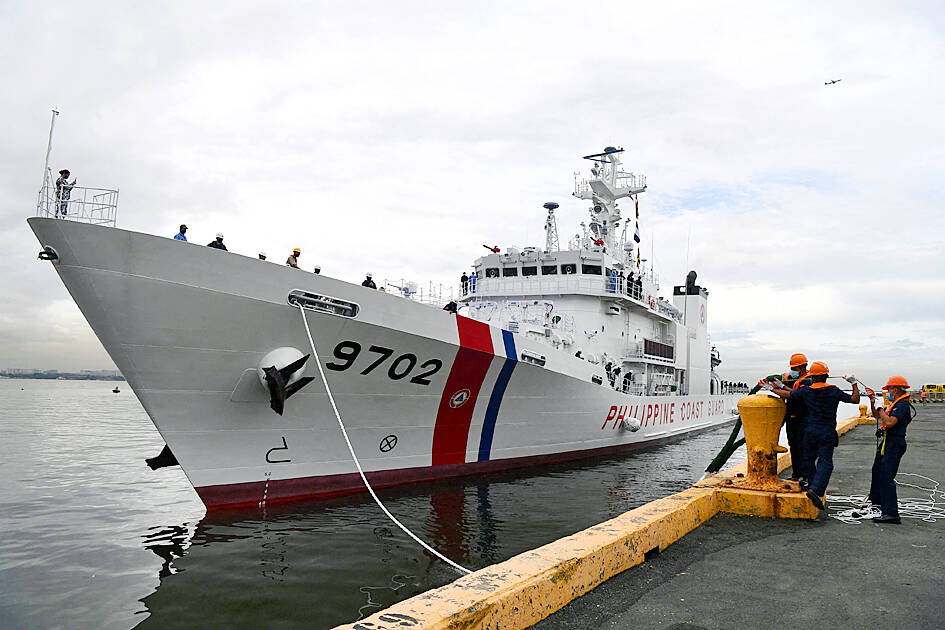The Philippines has agreed to buy five coast guard patrol ships from Japan in a deal worth more than US$400 million, Manila said yesterday, as the Southeast Asian nation faces growing Chinese pressure in the South China Sea.
Japan is to loan the Philippines ¥64.38 billion (US$413 million) to buy the five 97m multi-role response vessels and pay for the “development of the required support facilities,” the Philippine Department of Foreign Affairs said in a statement.
“This will support the PCG [Philippine Coast Guard] in improving its capabilities for maritime operations particularly in addressing transnational crimes,” the statement said.

Photo: AFP
Tokyo is a top provider of overseas development assistance to the Philippines.
The Philippine Coast Guard currently has two 97m patrol vessels as part of a fleet seen as inadequate for patrolling waters around the vast archipelago nation.
Its vessels have been involved in several collisions with Chinese coast guard ships around disputed reefs in the South China Sea, which Beijing claims almost entirely.
Philippine Coast Guard ships have also been fired on with water cannons by the China Coast Guard, with the latest incident happening on April 30 near the China-controlled Scarborough Shoal (Huangyan Island, 黃岩島).
The triangular chain of reefs and rocks that make up the shoal lies 240km west of the Philippines’ main island of Luzon and nearly 900km from Hainan, the nearest major Chinese land mass.
Japan invaded and occupied the Philippines during World War II, but the two nations have since grown closer due to trade and investment, and more recently, to counter China’s assertiveness in the region.
As part of efforts to deepen their security cooperation, Manila and Tokyo are negotiating a defense pact that would allow the nations to deploy troops on each other’s territory.
The leaders of Japan and the Philippines — both longtime allies of the US — were in Washington last month for a trilateral summit with US President Joe Biden.
Tensions over the South China Sea, combined with saber rattling over China’s claims to Taiwan, have prompted Biden to boost alliances in the region.
Beijing claims most of the waterway, brushing off rival claims from other nations and an international ruling that its assertion has no legal basis.

DEFENSE: The first set of three NASAMS that were previously purchased is expected to be delivered by the end of this year and deployed near the capital, sources said Taiwan plans to procure 28 more sets of M-142 High Mobility Artillery Rocket Systems (HIMARS), as well as nine additional sets of National Advanced Surface-to-Air Missile Systems (NASAMS), military sources said yesterday. Taiwan had previously purchased 29 HIMARS launchers from the US and received the first 11 last year. Once the planned purchases are completed and delivered, Taiwan would have 57 sets of HIMARS. The army has also increased the number of MGM-140 Army Tactical Missile Systems (ATACMS) purchased from 64 to 84, the sources added. Each HIMARS launch pod can carry six Guided Multiple Launch Rocket Systems, capable of

TRAJECTORY: The severe tropical storm is predicted to be closest to Taiwan on Wednesday and Thursday, and would influence the nation to varying degrees, a forecaster said The Central Weather Administration (CWA) yesterday said it would likely issue a sea warning for Tropical Storm Podul tomorrow morning and a land warning that evening at the earliest. CWA forecaster Lin Ting-yi (林定宜) said the severe tropical storm is predicted to be closest to Taiwan on Wednesday and Thursday. As of 2pm yesterday, the storm was moving west at 21kph and packing sustained winds of 108kph and gusts of up to 136.8kph, the CWA said. Lin said that the tropical storm was about 1,710km east of Oluanpi (鵝鑾鼻), Taiwan’s southernmost tip, with two possible trajectories over the next one

Tropical Storm Podul strengthened into a typhoon at 8pm yesterday, the Central Weather Administration (CWA) said, with a sea warning to be issued late last night or early this morning. As of 8pm, the typhoon was 1,020km east of Oluanpi (鵝鑾鼻), Taiwan’s southernmost tip, moving west at 23kph. The storm carried maximum sustained winds of 119kph and gusts reaching 155kph, the CWA said. Based on the tropical storm’s trajectory, a land warning could be issued any time from midday today, it added. CWA forecaster Chang Chun-yao (張竣堯) said Podul is a fast-moving storm that is forecast to bring its heaviest rainfall and strongest

CRITICISM: It is deeply regrettable that China, which is pursuing nuclear weapons, has suppressed Taiwan, which is pursuing peace, a government official said Representative to Japan Lee Yi-yang (李逸洋) yesterday accused Beijing of interference after Taiwan’s official delegation to the Nagasaki Peace Memorial Ceremony in Japan was assigned seating in the “international non-governmental organizations [NGO]” area. “Taiwan is by no means an international NGO, but a sovereign nation that is active on the international stage,” Lee said. Lee and Chen Ming-chun (陳銘俊), head of the Taipei Economic and Cultural Office (TECO) in Fukuoka, attended the ceremony in Nagasaki yesterday, which marked the 80th anniversary of the atomic bombing of the city. That followed Lee’s attendance at the Hiroshima Peace Memorial Ceremony on Wednesday